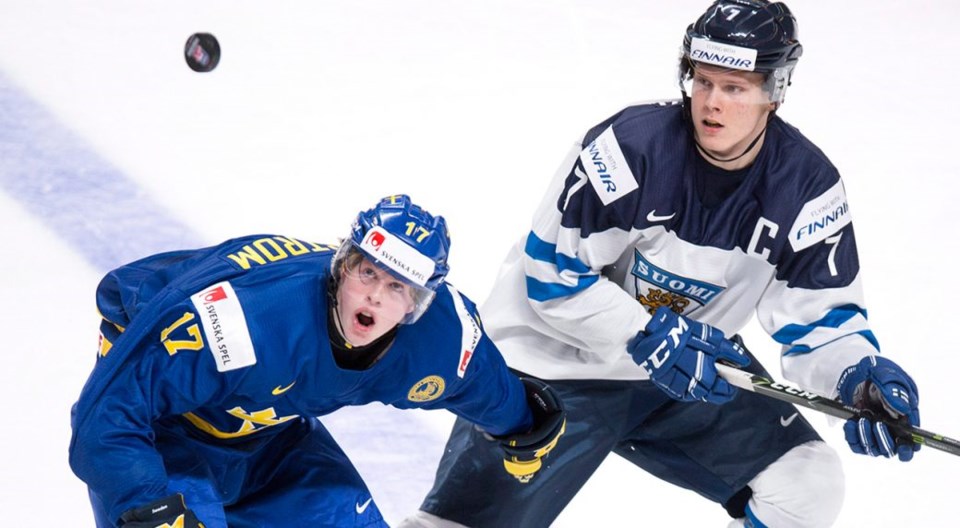Olli Juolevi is going to be fine.
Probably.
The Canucks announced Monday that the 20-year-old defenceman requires a microdiscectomy, which is a minimally invasive back surgery. Anytime that a surgical procedure is required, there’s a risk of complications, but in Juolevi’s case, this should just be a minor procedure with little risk.
Jim Benning, at least, is confident about that Juolevi will be 100% by training camp.
“It’s just a minor surgery,” said Benning. “He should be up and going in four to six weeks. They are pretty simple operations now and it’s bit of a setback, but he’s just going to have to train harder at the end of the summer to be ready to go.”
Leg pain, rather than back pain, is the usual symptom that leads to a microdiscectomy. A bulging or herniated disc in the spine is likely putting pressure on spinal nerves. The discectomy will remove the bulging portion of the disc, without affecting any of the surrounding joints, ligaments, or muscles. The structure of the spine itself is unaffected.
All of this bodes well for Juolevi’s recovery. While it’s bad timing for him to miss over a month of training during an important summer for his development, it shouldn’t impact his long-term NHL future. As pointed out by Jeff Paterson, it’s the same procedure that Alex Edler had in late January in 2011. Edler missed two months and returned in time for the playoffs, where he averaged nearly 25 minutes per game enroute to the Stanley Cup Finals.
Jo Innes, of The Sporting News, wrote a comprehensive breakdown of microdiscectomy from a hockey perspective back in 2011, when Daniel Alfredsson had the procedure. She cites a study titled SPORT (Spine Patient Outcomes Research Trial) that concluded that “patients with lumbar herniations showed significantly more improvement in pain and functionality with discectomy than patients who used non-surgical interventions.”
In other words, it’s better that Juolevi get this surgery now than try to train through the pain or deal with it via non-surgical methods.
In other other words, there’s no need to panic.
When it comes to Canucks fans and panic, however, “need” doesn’t enter into it. The concern is understandable: a Canucks prospect with a back issue brings to mind Cody Hodgson and his misdiagnosed back injury that derailed his career.
While Juolevi’s situation is vastly different from Hodgson’s, it is a helpful reminder that the Canucks can’t depend on only one prospect. There is so much uncertainty surrounding prospects and whether or not they will develop as expected. Some of that is within the control of the team and the prospect, but some of it is not, particularly when it comes to medical issues.
When Hodgson was picked, it was hoped that he would be the future number one centre and potentially captain for the Canucks, an heir apparent to Henrik Sedin. When he didn’t turn out to be that player in the NHL, the Canucks had little else in the prospect pool to rise up in his place. In many ways, the Canucks are still affected by that today.
Hodgson’s medical diagnosis could not have been anticipated, nor could it have been prevented. It wasn’t just back pain: he suffered from shortness of breath, blackouts and heart arrhythmia towards the end of his short NHL career. In his final season with the Nashville Predators, he was finally properly diagnosed with malignant hyperthermia.
Malignant hyperthermia is a genetic disorder, so it wasn’t something that could have been prevented. Most people who have it experience few or no symptoms before it is triggered. It’s usually triggered by undergoing general anaesthesia, but heavy physical exercise (like hockey) can also be a trigger.
Hodgson provides just one example of how a prospect’s development can derail due to circumstances beyond their control. When you’re in charge of an NHL team and attempting to chart a path into the future, you can’t rely on every single prospect, even the blue-chip prospects, to make it and become an impact player.
Juolevi’s back surgery simply provides another reminder. His procedure is minor and he should completely recover with no issues. But if his injury was more significant, the Canucks would be in real trouble.
Beyond Juolevi, the Canucks simply don’t have enough depth on defence in their prospect pool. In Utica with the Comets, the Canucks have some defencemen with potential of playing on the third pairing in the NHL like Guillaume Brisebois, Ashton Sautner, and Jalen Chatfield, but they lack high-end defensive prospects.
The Canucks can remedy this situation at the 2018 entry draft, but even then still need to build more quality depth on defence. Ideally, you build redundancies into a prospect pool. If multiple prospects with similar skill sets pan out, then you either have a better team in the NHL or additional players available to trade.



